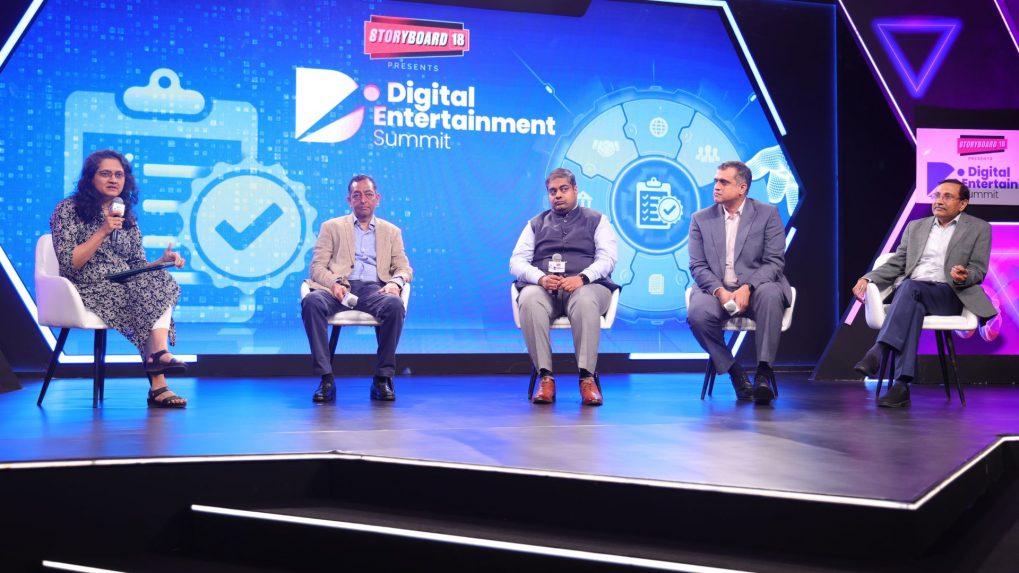Advertising
From Pink Slips to Silent Sidelining: Inside adland’s layoff and anxiety crisis

In a high-stakes panel discussion at the Storyboard18 Digital Entertainment Summit, some of India's foremost legal experts delved deep into the pressing issue of regulating online gaming.
Moderated by Gowree Gokhale, Independent legal advisor, the session titled "Effective Regulatory Structure for Online Gaming in India" featured a powerhouse panel including Gopal Jain (Senior Counsel), Dhruv Garg (Gaming and Tech Lawyer), Nandan Kamath (Principal Lawyer, LawNK), and Rakesh Maheshwari (Former Senior Director, MeitY).
Gokhale opened the session with a critical lens: "We are ending this conversation with the legal landscape... what could be good balanced regulation? We have heard each panel mention that, but what does it mean?"
Also Read: Opinion Trading platform is betting and gambling: MC Sarangan of TNOGA at Storyboard18 DES 2025
Children and Gaming: Beyond Screen Time
Setting the stage for a nuanced conversation, Gokhale prompted Dhruv Garg to outline the risks that children face in the digital gaming space. Garg emphasized that discussions often overly focus on screen time and miss the broader matrix of risks.
"We have to look at the risk matrix... A, what are the physical and psychological impact of over gaming? There are problems with posture... Then also are there certain psychological impacts... the content and the interaction," Garg said.
He pointed out the lack of an Indian age-rating system and the social risks embedded in online multiplayer interactions: "A 13-year-old could be playing with a 32-year-old. Most of the time you hope that the adult is smart enough... but sometimes it's not, and there are cases."
Skill cs Chance: A Legal Tightrope
India's regulatory confusion hinges on the classical legal conundrum of "skill versus chance." Gopal Jain emphasized the long-standing jurisprudence but stressed the need for a central regulatory structure.
"The beauty of the Indian legal system is creativity... But I think the need of the hour really is for the central government to have an overarching regulatory framework for the online gaming system... a clear Lakshman Rekha has to be drawn," said Jain.
Nandan Kamath added a data-driven perspective, pointing to the limitations of the current jurisprudence: "The skill versus chance debate has been presented as a legal analysis, but it's actually finding a fact... What we do need is greater amounts of data... It's almost criminal not to use [AI and machine learning] in determining these fine lines."
He highlighted how existing legal tests rely too heavily on judicial gut-feeling rather than empirical assessment, "Right now it's either you're successful at innovation or you're breaching criminal law."
Federal Fissures: Centre vs State
The federal tug-of-war between Centre and State governments emerged as a persistent hurdle. Kamath questioned the prevailing wisdom that puts gaming under state jurisdiction: "You look at entry 31 of the union list, that's telecommunications... The harms you're trying to address is broader impact."
Gokhale underlined the transparency and traceability advantages of online platforms over physical gambling dens, suggesting digital regulation could actually be more enforceable if approached correctly.
MeitY's Rakesh Maheshwari, who helped shape the IT rules, revealed the motivations behind the "permissible online gaming" framework: "The whole idea was that whatever is not permissible becomes impermissible... And it should preferably be decided by experts, not the government... We therefore wanted the self-regulating bodies, independent self-regulating bodies to be brought in."
The Offshore Threat and Regulatory Disparity
A unanimous concern was the unchecked proliferation of offshore betting platforms. Jain said it was time to take the bull by the horns: "These elements are able to play in these gray areas... So that whole parallel industry is flourishing and thriving... New revamped law with teeth in it... otherwise, you are allowing an illegitimate activity to eclipse [the legitimate one]."
Kamath offered a sobering reality check: "You are actually better off being an offshore betting website than an onshore gaming website. That is the reality today."
Garg noted the massive scale of offshore betting - 20 million compared to India's 3 billion gaming industry - and questioned the uneven burden on local players. "The only way is to show that the Indian guys are at least doing their best... But the offshore guys which are 6, 7, 10 times bigger have no compulsion."
The Path Forward: Enforcement, Empirical Data, and Digital Natives
Gokhale called for a stronger signaling mechanism to empower municipal and state-level enforcement: "Under the Drugs and Cosmetic Act, the act is at the center, but the FDA locally implements it. So do you think something like that may work?"
"When it comes to online advertisements, if you just leave it to the states... it actually goes offshore also. It's only the center... that has to have a major role to play," Maheshwari responded.
Kamath concluded with a call for informed, empathetic policymaking: "We are getting worse and worse at preventing harms in the digital world because lots of the lawmakers have not populated the digital world. Lawmakers are actually responding from fear rather than from understanding of digital spaces."
The panel agreed on the critical need for a clear legal framework, an empowered and transparent regulatory body, and a multi-tiered governance model involving both Centre and States. Jain wrapped the discussion by proposing a collaborative solution: "This is a good case to have a jugalbandi… the dominant role is to be played by the central government… but with a clear charter of go and no-go areas, and good coordination.”
From purpose-driven work and narrative-rich brand films to AI-enabled ideas and creator-led collaborations, the awards reflect the full spectrum of modern creativity.
Read MoreLooking ahead to the close of 2025 and into 2026, Sorrell sees technology platforms as the clear winners. He described them as “nation states in their own right”, with market capitalisations that exceed the GDPs of many countries.